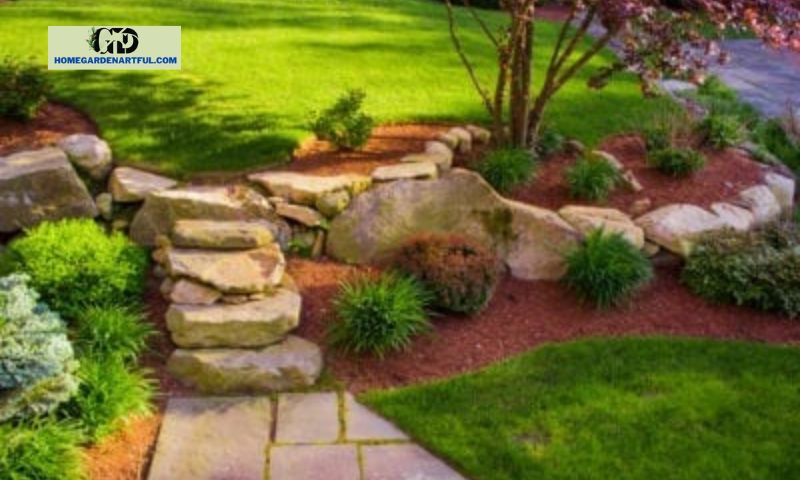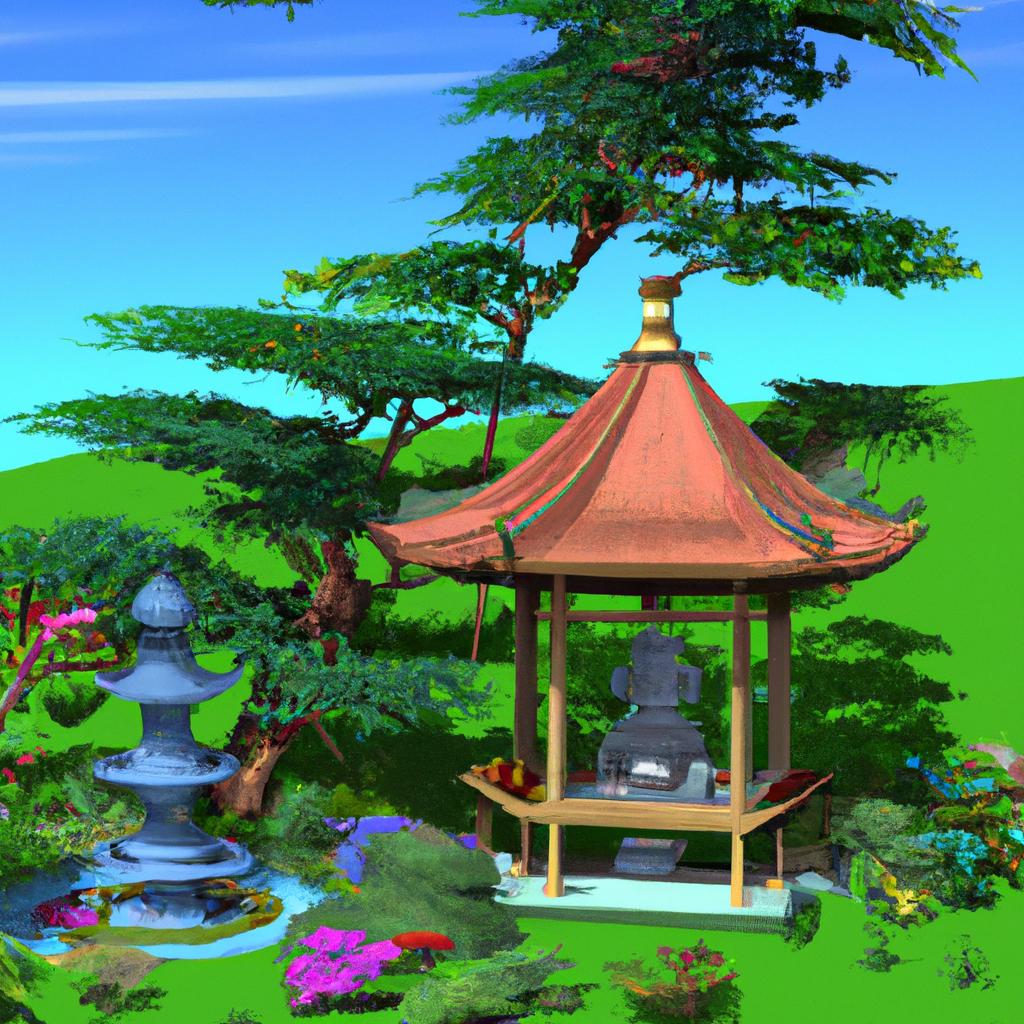Have you ever wondered how you can create a tranquil and harmonious outdoor space? Look no further than Feng Shui landscape design. Discover at homegardenartful.com! By incorporating ancient Chinese principles into your landscaping, you can transform your garden into a serene sanctuary that not only looks beautiful but also brings balance and harmony to your surroundings.
Defining feng shui landscape design
Feng Shui, which translates to “wind and water,” is an ancient philosophy that emphasizes the relationship between humans and their environment. Feng Shui landscape design is the practice of harmonizing outdoor spaces by arranging elements in a way that optimizes the flow of energy, known as QIt takes into account the placement of structures, plants, and natural elements to create a balanced and inviting atmosphere.
The Importance and Benefits of Implementing Feng Shui Principles
When you incorporate Feng Shui principles into your landscape design, you invite a multitude of benefits into your life. A thoughtfully designed outdoor space can enhance your well-being, promote relaxation, and create a sense of tranquility. By aligning with the natural flow of energy, you can attract positive vibrations, improve the overall ambiance, and foster a deeper connection with nature.
Overview of the Article’s Structure and Key Points
In this article, I will guide you through the intricacies of Feng Shui landscape design, providing you with the knowledge and tools to create a harmonious outdoor space. We will explore the fundamental principles of Feng Shui, discuss how to incorporate these elements into your design, and uncover practical tips for maximizing positive energy flow. So, let’s embark on this journey together and discover the transformative power of Feng Shui landscape design.
Next Section: Understanding Feng Shui Principles in Landscape Design
Understanding Feng Shui Principles in Landscape Design

A. The Basics of Feng Shui and its Connection to Nature
Feng Shui is deeply rooted in the belief that our environment has a profound impact on our well-being. It emphasizes the connection between humans and nature, recognizing the importance of creating a harmonious relationship with the natural world. By embracing the principles of Feng Shui in landscape design, we can create outdoor spaces that not only enhance the aesthetics but also promote a sense of balance and tranquility.
B. Key Elements and Principles of Feng Shui Landscape Design
Incorporating Feng Shui principles into your landscape design involves understanding and implementing key elements that contribute to a harmonious environment. Let’s delve into these essential principles:
1. Balance and Harmony
Balance is at the core of Feng Shui landscape design. It involves the careful arrangement of elements to create a visually pleasing and energetically balanced space. Achieving balance can be done by considering the placement of structures, plants, and other design elements to create a sense of equilibrium and tranquility.
2. Flow of Energy (Qi)
Qi, the life force energy, is the driving force behind Feng ShuIn landscape design, it is vital to create a smooth and unobstructed flow of energy throughout your outdoor space. This can be achieved by incorporating pathways and walkways that guide the flow of Qi, as well as ensuring that trees, plants, and structures do not impede its movement.
3. Placement and Arrangement of Elements
The placement and arrangement of elements in Feng Shui landscape design play a crucial role in promoting positive energy flow. Consideration should be given to the positioning of plants, water features, and structures to optimize the flow of Qi and create a harmonious environment.
4. Symbolism and Meaning in Design
Feng Shui places great importance on symbolism and meaning. Each element in your landscape design should be chosen with purpose, as they can carry specific energies and represent different aspects of life. By incorporating meaningful symbols and elements, you can enhance the overall energy and intention of your outdoor space.
Next Subsection: Incorporating Feng Shui Elements in Landscape Design
Incorporating Feng Shui Elements in Landscape Design
To create a truly harmonious outdoor space, it is essential to incorporate Feng Shui elements into your landscape design. By carefully considering the location, plants, materials, and layout, you can optimize the flow of positive energy and create a balanced and harmonious environment. Let’s explore these key aspects in more detail:
Choosing the Right Location and Orientation
Consideration of Local Environment and Geographic Features
When designing your landscape, take into account the unique characteristics of your local environment. Observe the topography, climate, and natural elements present in your area. By understanding how these factors interact, you can choose the most suitable location and orientation for your outdoor space. For example, if you live in an area with strong winds, you might want to create windbreaks or strategically position structures for protection.
Harnessing Natural Elements and Energies
Incorporating natural elements and energies is crucial in Feng Shui landscape design. Pay attention to the placement of trees, rocks, and water features. Trees provide shade, enhance privacy, and symbolize growth and stability. Rocks can be strategically positioned to represent mountains, symbolizing strength and support. Water features such as ponds or fountains represent the flow of energy and bring a sense of tranquility. By harnessing these elements, you can create a harmonious and visually appealing landscape.
Selecting Suitable Plants and Materials
Plants with Symbolic Meaning and Positive Energy
In Feng Shui, plants play a significant role in creating positive energy flow. Choose plants with symbolic meanings and positive energy to enhance the overall ambiance of your outdoor space. For example, bamboo represents strength and resilience, while flowering plants such as orchids and lotus symbolize beauty and purity. Incorporating these plants not only adds visual interest but also promotes a sense of well-being.
Use of Natural Materials and Colors
In addition to plants, the materials and colors you choose for your landscape design contribute to the overall Feng Shui energy. Opt for natural materials such as wood, stone, and bamboo for hardscape elements like pathways and structures. These materials connect your outdoor space with nature and create a sense of grounding. Furthermore, consider the colors you use in your design. Earthy tones like greens, browns, and blues create a soothing and harmonious atmosphere.
Creating a Balanced and Harmonious Layout
Placement of Structures and Hardscape Elements
Carefully consider the placement of structures and hardscape elements in your landscape design. Ensure that they are aligned with the principles of Feng ShuFor example, avoid placing structures or large objects directly in the path of energy flow. Instead, create a meandering pathway that allows energy to flow freely throughout the space. Additionally, consider the scale and proportion of your structures to maintain balance and harmony.
Integration of Water Features and Outdoor Furniture
Water features, such as ponds, fountains, or even a small birdbath, bring a sense of tranquility and positive energy to your outdoor space. Integrate these elements strategically, considering their placement and size. Additionally, choose outdoor furniture that complements the overall design and encourages relaxation and comfort. By creating a balanced layout with the right placement of water features and furniture, you can enhance the positive energy flow in your outdoor space.
Now, let’s move on to the next section: “Enhancing Positive Energy Flow in Feng Shui Landscape Design.”
Enhancing Positive Energy Flow in Feng Shui Landscape Design

To truly harness the power of Feng Shui in your landscape design, it is crucial to enhance the positive energy flow within your outdoor space. By incorporating specific elements, you can optimize the flow of Qi and create a harmonious environment that uplifts your spirit. Let’s explore three key ways to enhance positive energy flow in Feng Shui landscape design.
A. Utilizing Water Elements
Water is a fundamental element in Feng Shui, symbolizing abundance, wealth, and emotional well-being. Incorporating water features such as ponds, fountains, and waterfalls can have a profound impact on the energy within your outdoor space. When placing these elements, consider their design and positioning carefully.
1. Placement and Design of Ponds, Fountains, and Waterfalls
Strategically position water features to encourage the free movement of energy throughout your garden. Place them in areas where they can be easily seen and heard, creating a soothing and refreshing ambiance. Consider the size and design of the water feature, ensuring it complements the overall aesthetics of your landscape.
2. Importance of Clean and Flowing Water
Clean and flowing water is essential to maintain positive energy flow. Stagnant or dirty water can disrupt the harmonious balance and lead to negative energy accumulation. Regularly clean and maintain your water features to ensure they remain in optimal condition, promoting a continuous flow of positive energy.
B. Maximizing Natural Light and Ventilation
Natural light and fresh air play a vital role in Feng Shui, as they represent vitality, growth, and positive energy. By maximizing these elements in your landscape design, you can create an uplifting and vibrant outdoor space.
1. Positioning of Trees and Plants for Shade and Breeze
Strategically plant trees and shrubs to provide shade in areas where you spend time outdoors. Shade not only enhances comfort but also creates a sense of tranquility. Additionally, consider the orientation of your garden to maximize the natural breeze, allowing it to flow freely through your outdoor space.
2. Strategic Placement of Windows and Openings
When designing structures, ensure the placement of windows and openings allows for ample natural light to filter in. Natural light not only brightens your surroundings but also has a positive impact on mood and well-being. By strategically positioning windows, you can invite an abundance of positive energy into your indoor and outdoor spaces.
C. Incorporating Sound and Aromatherapy
Sound and aroma are powerful tools in Feng Shui, capable of transforming the energy within your landscape. By incorporating pleasant sounds and aromas, you can create a harmonious and inviting atmosphere that promotes relaxation and balance.
1. Importance of Pleasant Sounds and Aromas in Feng Shui
Selecting sounds and aromas that evoke positive emotions and tranquility is key to enhancing the energy flow within your outdoor space. Consider wind chimes, gentle water features, or even soft music to create a soothing soundscape. Additionally, integrate fragrant plants and essential oils known for their calming and uplifting properties.
2. Integration of Wind Chimes, Fragrant Plants, and Essential Oils
Place wind chimes strategically to capture gentle breezes and create melodic sounds that resonate throughout your garden. Select fragrant plants such as lavender, jasmine, or rosemary to infuse your landscape with delightful scents. Essential oils can also be used in diffusers or incorporated into natural sprays to further enhance the aromatherapeutic experience.
By incorporating water elements, maximizing natural light and ventilation, and incorporating pleasant sounds and aromas, you can enhance the positive energy flow within your Feng Shui landscape design. These elements work symbiotically to create a serene and uplifting outdoor space that rejuvenates your mind, body, and soul.
Next Section: Section V – Practical Tips for Implementing Feng Shui Landscape Design
Practical Tips for Implementing Feng Shui Landscape Design
Are you ready to put your Feng Shui landscape design knowledge into action? Let’s explore some practical tips that will help you create a harmonious outdoor space that radiates positive energy.
A. Working with a Professional Feng Shui Consultant or Landscape Designer
If you’re new to Feng Shui or want to ensure your design is expertly executed, consider seeking guidance from a professional Feng Shui consultant or landscape designer. These experts have a deep understanding of the principles and can provide valuable insights tailored to your specific space. They can help you determine the best layout, select suitable plants and materials, and fine-tune the energy flow within your landscape. Collaborating with a professional will ensure that your design aligns with the essence of Feng Shui and maximizes its benefits.
B. Assessing and Balancing the Five Elements in Design
In Feng Shui, the five elements – wood, fire, earth, metal, and water – play a crucial role in creating a harmonious environment. Each element represents different qualities and energies. To achieve a balanced landscape, assess the presence of these elements in your design and make adjustments as needed. For example, if your space lacks the earth element, incorporate earthy colors, such as brown or beige, and add rocks or pottery to introduce stability and grounding energy. By carefully considering and balancing the five elements, you can create a landscape that harmonizes with the natural world and promotes positive energy flow.
C. Regular Maintenance and Upkeep for Sustaining Positive Energy Flow
To maintain the positive energy flow in your Feng Shui landscape, regular maintenance is essential. Keep your plants healthy and vibrant by providing proper care, such as watering, pruning, and fertilizing. Remove any dead or decaying plants promptly, as they can disrupt the energy flow. Keep pathways clear and clutter-free to allow the Qi to flow freely throughout your space. Regularly cleanse and refresh the water features to ensure they remain clean and flowing. By dedicating time and effort to maintaining your outdoor space, you sustain the positive energy and reap the benefits of a harmonious environment.
Next Section: Conclusion


